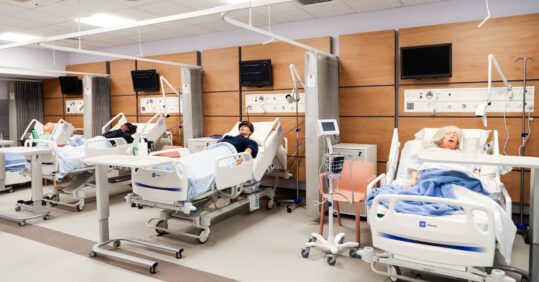Social care nurses upskill in clinical training initiative

An initiative to upskill adult social care (ASC) nurses has been developed by Middlesex University to deliver vital, but sometimes overlooked, death-verification training.
Middlesex nursing academics have partnered with North Central London Care System, who work in partnership with the North Central London Training Hub, to address training gaps in an effort to support and expand the future workforce.
The training focused on developing nurses’ clinical skills, providing more placements to student nurses and giving residents and their families a say on the care they are offered.
More than 1,00 ASC nurses have now been trained in ‘verification of expected adult death’ at the university’s simulation centre, with training now being expanded to include catheter, dementia, and end of life clinical skills.
Related Article: QICN bids farewell to Dr Crystal Oldman as she retires from CEO role
The scheme was ‘highly commended’ at the London Higher Awards ceremony held on 6 June.
The programme was developed after a 2023 survey of 500 adult social care nurses working in 48 North Central London care homes reported that a lack of ‘high-quality clinical training’ had undermined staff retention, care standards, and the support available for nursing students.
This comes as analysis from the King’s Fund think tank found that almost 10% of roles in adult social care were vacant in 2022/23, with vacancies expected to rise further.
Pam Hodge, senior lecturer in practice nursing at Middlesex University, stressed how the training brings ASC nurses together, contrasting the siloed working they usually face in care settings.
‘The idea that you’re having people learning together, working together, supporting each other, developing that kind of community of practice in that short time, I think is really helpful.
‘I think it’s an opportunity for people to expand within the sector, developing their local knowledge of what’s going on, because these nurses won’t necessarily have that opportunity in the way that big trusts do.
‘They may have had in house training, which is all well and good, but if you’re the nurse training you probably can’t focus on that too much because you’ve got so many other things going on,’ Ms Hodge told Nursing in Practice.
She explained how 46% of people working in adult social care are nurses, adding that more attention is needed to train and support nurses in care homes, or those who work away from NHS and private hospital settings.
Related Article: England’s domestic supply of learning disability nurses projected to end by 2028
Her message was mirrored by Fiona Suthers, head of clinical skills and simulation at Middlesex University, who said: ‘We’ve got to look at the ways we upskill in social care, it’s equally important to what’s going on in our acute areas.
‘A very large percentage of patients are nursed within social care now, so it is essential to address this.
‘It’s about empowering these nurses to take responsibility for their own learning, to say look, I can actually really change the care I deliver to patient’s if I get more knowledge.’
Training at the simulation centre involves using hospital grade equipment and working to reassure and de-escalate conflict with actors posing as family members, in order to create a hyper-realistic learning environment.
Related Article: Not enough specialist nurses to provide palliative care in rural communities
Recalling her training, Sylvia Mthabela, manager and matron at Fernbank Nursing Home, said: ‘For us as nurses on the floor, we gain a lot of confidence knowing that we are able to decide whether someone has actually deceased, and to exercise all the duties that were previously done by the GP.’
She added: ‘We need more of this training in the nursing home, as it’s also making other people want to come and work in the nursing home, knowing that you have that level of independence where you can practise confidently.’

See how our symptom tool can help you make better sense of patient presentations
Click here to search a symptom




